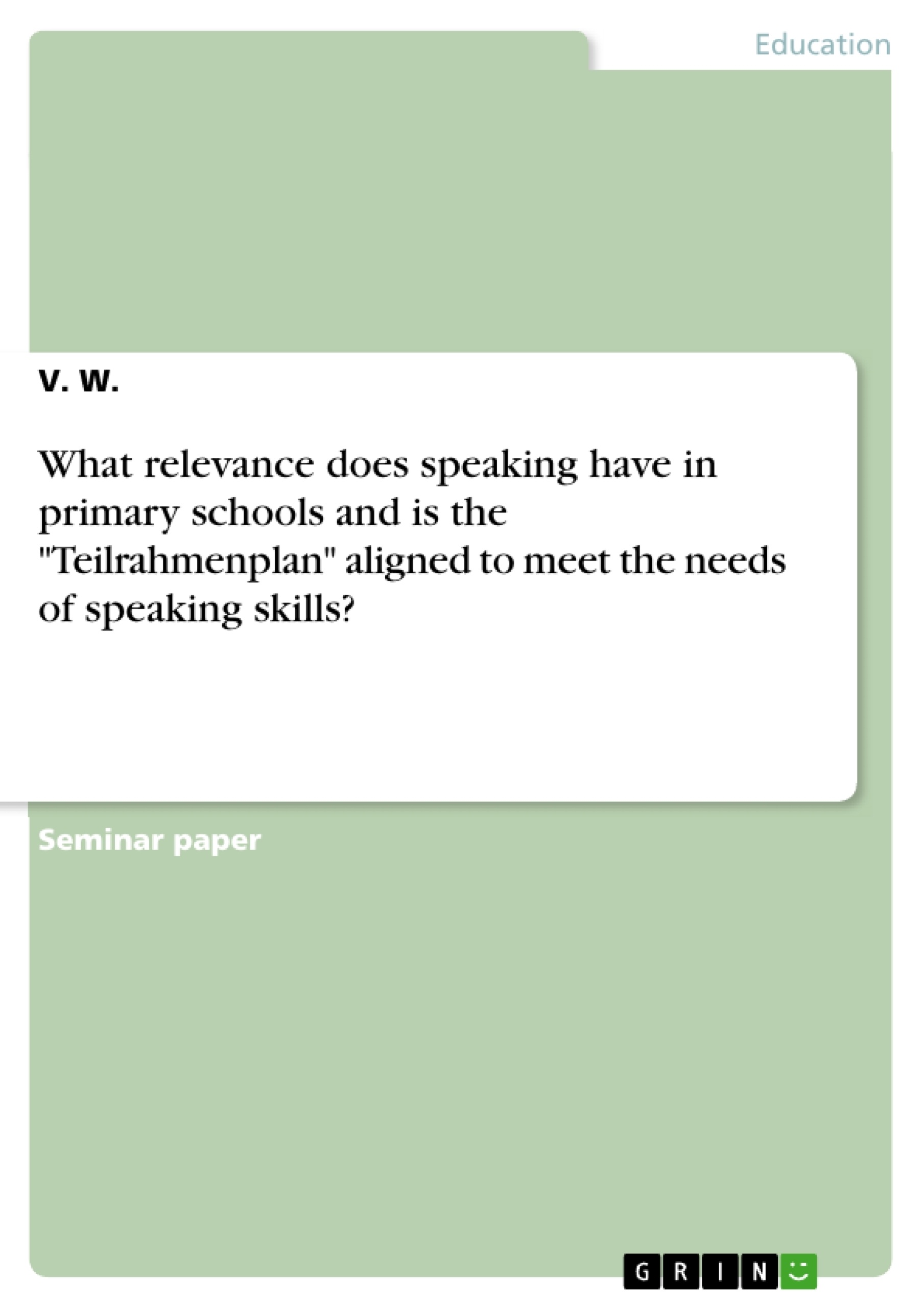As in many other countries English is an important lingua franca in Germany. Before 2001, it was only learned from class five or in some states from class three. Since 2001, English or another foreign language is an obligatory subject in the primary school from class one to four. The ability to communicate in a foreign language should be supported. Speaking skills are necessary for achieving this goal. As a consequence, speaking tasks should occupy an important place in everyday school live. The "Unterrichtsorganisation Grundschule" allocates teaching time to all subjects and the foreign language acquisition got the fewest time of all primary school subjects. This term paper elaborates this problem and gives a brief overview about possibilities on how a teacher could handle this situation.
Inhaltsverzeichnis (Table of Contents)
- Introduction
- The Importance of Speaking in Primary School
- What is Important for Building a Conductive Ability of Speaking?
- The importance of a nice atmosphere
- The importance of input and authentic speaking situations
- How Do the "Teilrahmenplan Fremdsprachen" and the "Unterrichtsorganisation Grundschule" Deal with the Support of Speaking?
- The Problem Between the Contact Time and the Goals for Speaking in Primary School
- Didactic and Methodological Consequences
- The professionalism of a good teacher.
- Useful methods
- Rituals, Songs and Games
- Conclusion
Zielsetzung und Themenschwerpunkte (Objectives and Key Themes)
This term paper investigates the importance of speaking skills in primary school English language learning in Germany. It explores the alignment of the "Teilrahmenplan Fremdsprachen" with the development of speaking abilities. The paper examines the challenges posed by limited contact time and outlines strategies to address these issues.
- The significance of speaking skills in primary school English education.
- Factors contributing to a conducive learning environment for speaking.
- The alignment of the "Teilrahmenplan Fremdsprachen" with speaking skills development.
- The impact of limited contact time on speaking proficiency.
- Didactic and methodological approaches to enhance speaking skills.
Zusammenfassung der Kapitel (Chapter Summaries)
- Introduction: This chapter introduces the context of English language learning in primary schools in Germany, highlighting the importance of speaking skills. It outlines the structure and focus of the term paper.
- The Importance of Speaking in Primary School: This chapter discusses the paramount role of language in communication, emphasizing the need for speaking skills in second language acquisition. It explores the challenges of learning a second language compared to the first, emphasizing the importance of pronunciation and the role of teachers as role models.
- What is Important for Building a Conductive Ability of Speaking?: This chapter delves into the requirements for fostering speaking proficiency. It highlights the importance of a positive learning environment, minimizing shame and encouraging participation. The chapter also emphasizes the need for sufficient input, authentic speaking situations, and the role of the teacher in providing guidance and support.
Schlüsselwörter (Keywords)
This term paper focuses on the importance of speaking skills in primary school English language learning in Germany. It examines the alignment of the "Teilrahmenplan Fremdsprachen" with the development of speaking abilities, considering factors like contact time and learning environment.
Frequently Asked Questions
When did English become a mandatory subject in German primary schools?
Since 2001, learning a foreign language (usually English) has been obligatory from grades one to four in German primary schools.
What is the "Teilrahmenplan Fremdsprachen"?
It is the curriculum framework that sets the goals for foreign language acquisition, including the development of speaking skills in primary education.
What is the main problem with contact time for English in primary schools?
Foreign language acquisition often receives the least amount of teaching time compared to other subjects, making it difficult to achieve high-level speaking goals.
How can teachers foster a good atmosphere for speaking?
By creating a supportive environment that minimizes shame, using rituals, songs, and games to encourage authentic communication.
Why is pronunciation important in early language learning?
Primary school children are at an ideal age for phonetic mimicry, and the teacher serves as a vital role model for correct pronunciation.
- Arbeit zitieren
- Master of Education V. W. (Autor:in), 2014, What relevance does speaking have in primary schools and is the "Teilrahmenplan" aligned to meet the needs of speaking skills?, München, GRIN Verlag, https://www.grin.com/document/293171



